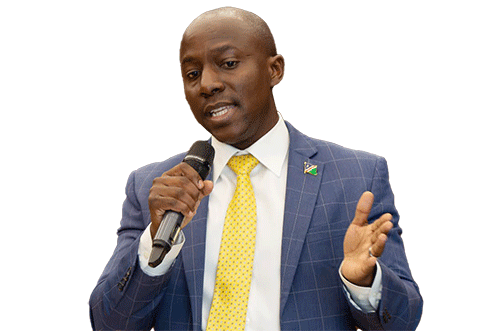Last week, government announced it would exercise its right to take up a 24% stake in the Hyphen Hydrogen Energy project at historical cost.
But the decision did not sit well with some Namibians.
“With massive amounts of capital required to establish this industry, calling for a free carry in Namibia where other competing countries are not, just reduces the competitiveness of the Namibian industry. That is the opposite of what competing countries are doing, who are offering massive incentives to attract investment,” observed James Mnyupe, Namibia’s green hydrogen commissioner, who doubles as Presidential economic advisor.
In a quest to explain government’s decision, he said a free carry reveals that it reduces the returns available for private investors, as this capital still needs to be paid for by someone. The effect of a free carry is relatively benign for sectors which require relatively small capital investments.
Additionally, those calling for free carry are doing it without considering the fact that Namibia will earn land rentals, royalties from green hydrogen sales and taxes, on top of the job-creation and localisation targets that the project has been tasked with delivering.
In a document seen by media late last week, the green hydrogen commissioner indicated that to fund its equity, government secured a letter of intent from the European Investment Bank (EIB) of €500 million (N$10.1 billion) in funding, which, according to him, should be sufficient to fund 100% of government’s equity requirements for phase one.
Mnyupe noted that government will evaluate other
funding options for its equity at financial close, including grants and debt funding from other financiers, should they be more favourable than the terms being offered by the EIB.
“The development budget of the project up to final investment decision is €93 million (N$1.8 billion). Government was able to negotiate to acquire a 24% stake in Hyphen, which results in a funding obligation for government of €23 million (N$468 million). Namibia already received €40 million (N$814 million) from the Dutch government in grants to help with the development of this and other projects in Namibia, which means that government still has €17 million (N$346 million) to use to de-risk other hydrogen projects,” he quantified.
Mnyupe added that €40 million (N$814 million) is in the SDG Namibia One Fund, and they intend to raise another €60 million (N$1.2 billion) from other sources around the world, all to be used to de-risk the development of this industry in the country.
National Planning Commission director general Obeth Kandjoze, who is also Namibia’s green hydrogen (GH) council chairperson, cleared up rumours that government has irresponsibly gone out and borrowed to pay for its equity.
“This is false and malicious in its intent. There is no loan that I know of that the finance minister has signed. No loan; a grant is what it is. We see facilities developed through relationships between a country like our government and another, and we drive on such roads. I don’t understand how grant suddenly overnight has become a loan,” he stated.
Mnyupe then gave the assurance that government negotiated hard to maximise the benefit that Namibia will receive in cold hard cash from the establishment of its green hydrogen industry, ensuring that a combination of fixed and variable revenue streams are secured. These include land rentals, environmental levies, revenue royalties, income taxes, and dividends from any equity stake that government holds.
He thus urged all Namibians to consider supporting government’s efforts to provide jobs and livelihoods to the people, while at the same time meeting its policy objectives to industrialise and diversify the Namibian economy, improving employment and livelihoods, and to become a responsible citizen of the global community.
However, some of those with mixed feelings about the 24% stake included Rally for Democracy and Progress’ (RDP) president Mike Kavekotora, who said the government must explain the quantity and qualify this stake.
“The project is a derivative of Namibian resources such as the Namibian sun, Namibian waters and Namibian land. All these are valuable resources, which the project cannot do without. Investors in this project must stop these illicit ways of doing business in Africa, and demonstrate a degree of honesty in their dealings. Offer the 24% free to Namibians, based on the resources that Namibia offered to make this project viable,” the politician emphasised.
Economist Rowland Brown also tweeted his concern that Namibia does not get the 24% in this deal free, but rather has to buy the stake.


